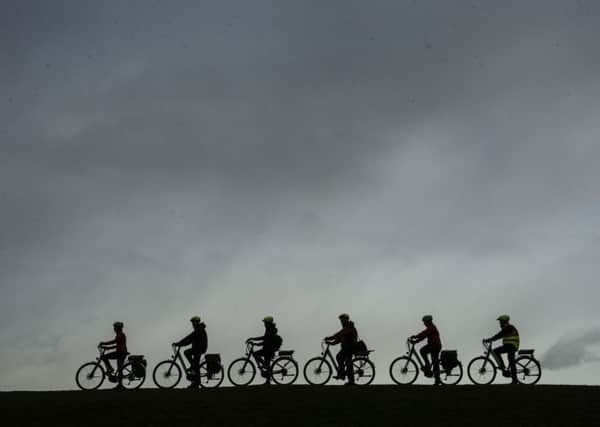Could cycling help you live seven years longer?


We are a nation in love with the car. According to the 2011 census, more than 60 per cent of Scotland’s 2.372m households has access to at least one car or van, while 21 per cent has two.
Our domestic travel is responsible for around 20 per cent of Scotland’s greenhouse gas emissions while flights abroad account for a further five per cent of total emissions.
Advertisement
Hide AdAdvertisement
Hide AdBut now a new Scottish Government campaign aimed at encouraging us all to become a little bit more ‘green’, is asking whether we could rethink our love affair with the car and learn how to get around again without costing the earth.
The national ‘go greener’ campaign is aimed at helping Scotland reduce greenhouse gas emissions by 42 per cent by 2020 and 80 per cent by 2050.
At its heart is a series of short films presented by comedian Phil Kay, which point out the ‘Stupidly Simple’ changes we could make to help cut down food waste, conserve energy, reuse more of what we have and recycle what we don’t need – as well as release our grip on the car steering wheel.
According to Dr Andrew Murray, Physical Activity advisor, Royal College of Physicians and Surgeons of Glasgow, ditching the car in favour of walking or cycling won’t just help the environment, it helps our bodies too. And with one in three journeys in Scotland less than a couple of miles, surely it can’t be that hard?
“Your body is made to move,” he says. “Scotland has been inhabited for 14,000 years and historically we have always been active.
“Initially that was having to catch food or avoid being eaten, more latterly as part of work. But now many of our jobs are desk based. So we need to take action ourselves.”
Medical research has recently suggested that sitting down too long every day is a modern health hazard, increasing our risk of heart disease, some cancers, diabetes and stroke.
Walking for just 30 minutes per day could add as much as seven years onto our lives.
Advertisement
Hide AdAdvertisement
Hide Ad“Walking and cycling are among the best things you can do for your health,” adds Dr Murray.
“And helping your kids be active is one of the best presents you can give them.
“Children who walk or cycle regularly get better marks at school, are happier, and are healthier.”
Being active out of the office is vital, but at work, simple changes like holding internet ‘hang out’ sessions rather than travelling to meetings or working at home, all help cut down our travel emissions.
According to Christopher McGinnis, chair of the 2050 Climate Group, which aims to give the 18 to 30s a voice on climate change issues, even tiny changes make a difference. “CO2 emissions from transport are responsible for approximately a quarter of the UK’s domestic CO2 emissions, with over 90 per cent of this from road based transport,” he says.
“Car sharing, more regularly using public transport, or walking or cycling to work, can make a big difference and will motivate others to do the same. Such actions can also lower travel costs, improve health and reduce the volume of traffic on our roads.”
If motoring is really the only option, habits such as maintaining a steady speed and avoiding unnecessary accelerating or braking will help cut emissions. Opting to car share or use a car club, which involves borrowing a car only when you really need it, means fewer cars on the roads.
Public transport – by bus, train and tram – offers a greener option than the car, while cycling is even better. And if your pedalling skills are rusty, Cycling Scotland (www.cyclingscotland.org) can help.
“Walking or cycling short journeys you can get the happy hormones going, and it’s great for the environment too,” says Dr Murray.
• Find out how to travel ‘greener’ by visiting www.greenerscotland.org